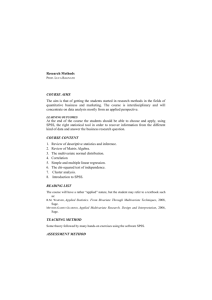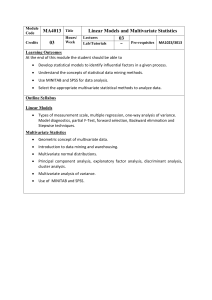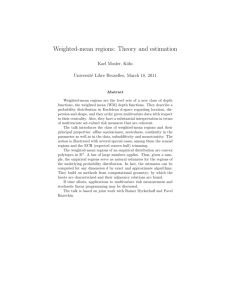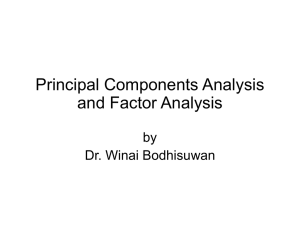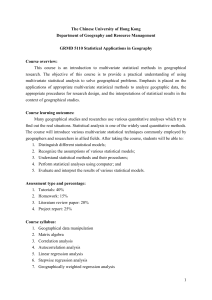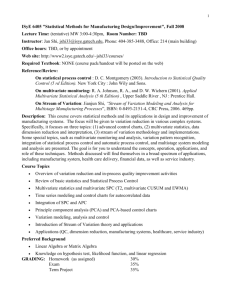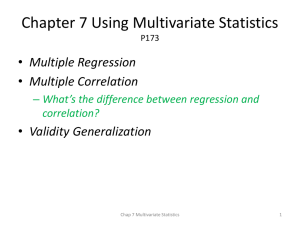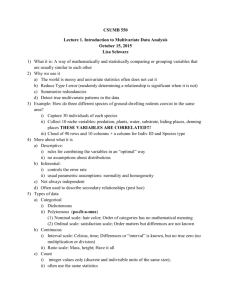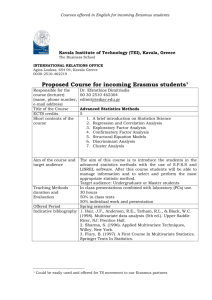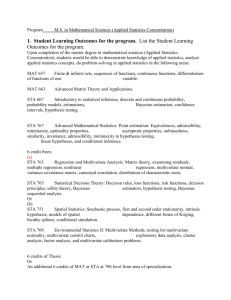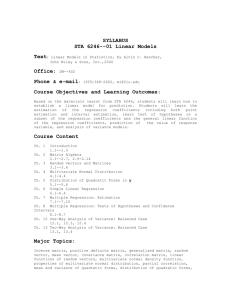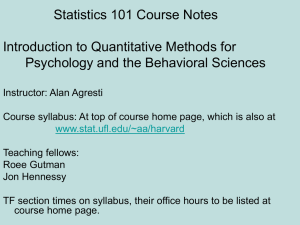PG Diploma /M - Department of Mathematics
advertisement
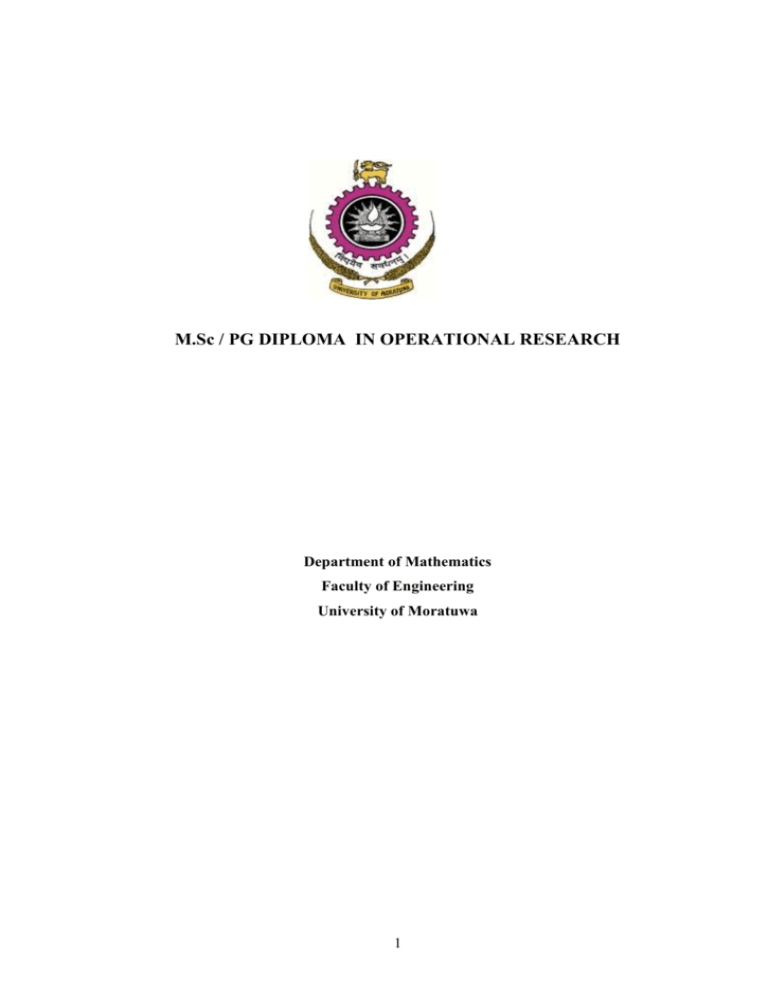
M.Sc / PG DIPLOMA IN OPERATIONAL RESEARCH Department of Mathematics Faculty of Engineering University of Moratuwa 1 MODIFIED CURRICULUM FOR M SC/PG DIPLOMA Semester I Compulsory Courses Course Name of the Course Credits Code Evaluation % Assignment Final Exam MA 5001 Introduction Statistics 4 40 10 60 20 MA 5002 Operational Research Techniques 1 4 40 10 60 20 MA 5003 Linear Models in Data Analysis 4 40 10 60 20 MA 5004 Principles of Management 4 40 10 60 20 Elective Courses Course Name of the Course Credits Code Evaluation % Assignment Final Exam MA 5005 Principles of Marketing 4 40 10 60 20 MA 5006 Numerical Methods 4 40 10 60 20 Semester 2 Compulsory Courses Course Name of the Course Credits Code Evaluation % Assignment Final Exam 4 40 10 60 20 MA 5008 Computer Programming for Operational Research Operational Research Techniques 1I 4 40 10 60 20 MA 5009 Multivariate Statistics for Data Mining 4 40 10 60 20 MA 5010 Time Series Analysis 4 40 10 60 20 MA 5011 Production and Operation Management 4 40 10 60 20 MA 5012 M Sc Project 20 Thesis MA 5007 2 -- Syllabi of the Courses Introduction to Statistics (MA 5001) Concept of probability, conditional probability and Bayes theorem, discrete and continuous random variables, descriptive statistics, inferential statistics, probability and sampling distributions, interval estimation and hypothesis testing, properties of various distributions (Binomial, Normal, Exponential, Poisson, Uniform etc) and their applications for operational research, statistical inferences on distribution theory, distributions associated with the Poisson process. introduction to decision theory, expected value of perfect and sample information. Data Analysis: Many of the ideas will be illustrated by use of the statistical software MINITAB, SPSS and MATLAB. Operational Research Techniques I (MA 5002) Modeling with linear programming, geometrical solution to problems with two decision variables, Simplex method including the two phase method of a solution of problems with mixed constraints, duality. transportation and assignment problems, theory of zero sum, two person matrix games, introduction to network algorithm including minimum connector problems, shortest and longest path algorithms and critical path analysis. Linear Models in Data Analysis (MA 5003) Introduction to linear models and general linear models, simple linear regressions, least square techniques, model diagnostics, use of different statistical indicators for validation the results, various linear transformations, multiple linear regression, non linear regression, model building techniques (R2 statistics, Adj R2, Cp, forward selection, backward elimination, stepwise method etc), handling multi collinearity in regression, Analysis of categorical data (concept of contingency tables, loglinear models for contingency tables, linear models for continuous data, linear models for binary data, design and analysis of experiments in operational research (concepts of experimental designs,: CRD, RCBD, Split Plot Design, Latin square design and data analysis, use of covariates in experimentations and analysis). Data Analysis: Real data are analyzed using Minitab, SAS & SPSS software. 3 Principles of Management (MA 5004) Management Functions: Major functions in the organizations/firm (marketing, human resource management, finance and accounting, production, and information systems), perspectives of the organization as a whole and the groups individuals within it, nature of organizations, distribution of power, decision-making and planning (fundamentals of managerial decision making, strategic planning and management), managing groups and teams (leadership, motivation and communication), managing organizational change and innovation. Organizational Environment: government and politics (the role of government in the economy and the legal framework). Markets (theory of the firm, oligopoly theory, transaction costs, and product market organizational linkages), Culture (culture-free versus culture specific perspectives and contrast between Japan and Western Organizations) Management Thought: evolution of Management Thought (outline of development of the main approaches to organization and management, encompassing the classical, human relations, system and contingency approaches), management in 21st century, review of changing organizational environment, ethics in management. Principles of Marketing (MA 5005) The role of marketing at the corporate and business level; Marketing information and marketing research: marketing intelligence, marketing research process, junctions, design and analysis of market survey, application of analytical techniques and computer software, analyzing the marketing environment, consumer markets and buyer behavior, industrial markets and organizational buyer behavior, market segmentation, targeting and positioning, new product development, managing the product line. Selecting and managing marketing channels, design of marketing communication and sales promotion, marketing services, international marketing and organization implementation and control of marketing programs Numerical Methods (MA 5006) Introduction to numerical analysis including the theory of finite differences, numerical integration and differentiation, solution of initial valued ordinary differential equations, solution of simultaneous linear algebraic equations by direct and iterative methods, solution of non-linear equations and elementary ideas of curve fitting. numerical solution of partial differential equations, Finite Element Methods. Practical Work: Use of published algorithms and packages for solving numerical problems. 4 Computer Programming for Operational Research (MA 5007) Introduction to Object Oriented Programming (OOP): Fundamentals of object orientation; object oriented concepts, object oriented analysis and design patterns, exception handling and building GUIs; Principles of data base management, Use of OOP for OR applications; Computer algorithms for OR applications. Operational Research Techniques II (MA 5008) Revised simplex algorithm, dual simplex algorithm, sensitivity analysis and parametric programming. integer programming, Gomory's cutting plane, branch and bound, the knapsack problem, delayed column generation, the cutting stock problem. dynamic programming, the inventory model, non-linear optimization. Simulation and Stochastic Models: Introduction to stochastic processes and their applications, difference equations, Markov chains. Introduction to simulation, queues and queue networks Applications of Multivariate Statistics in Data Mining (MA 5009) Introduction to multivariate statistics, concept of data miming and data warehousing, handling missing data from a statistical point of view, concept of repeated measurement data,, multivariate normal distribution, use of eigen values in multivariate analysis, geometry properties of multivariate data, multivariate plots and diagrams, comparison of univaraite and multivariate statistics, data mining techniques in multivariate statistics (multiple linear regression analysis:, non linear regression, principal component analysis, factor analysis, cluster analysis; canonical correlation analysis, correspondence analysis, discriminant analysis, Data Analysis: Real data are analyzed using statistical software such as Minitab, SAS and SPSS Time Series Analysis (MA 5010) Basic concepts of time series, ,autocorrelation and correlation, type of moving averages, trend analysis, smoothing techniques, decomposition techniques, theory of linear process related to time series; Autocorrelation and partial autocorrelation function, model building using univaraite Box Jenkins Approach (AR, MA, and ARMA models), Seasonal ARIMA models, Seasonal adjustment, Adjustment of prior factors, Bivariate Time Series. Kalman filtering, state space Modeling Financial Time Series: Concept of financial time series, Co-Integration and Present Value Modeling: Econometrics models, Heterosedacity; measurement errors and the Permanent 5 Income Hypothesis; simultaneous equation bias, indirect least squares, ARCH and GRACH models. Data analysis: real data are analyzed using Minitab, SAS and SPSS software packages. Production and Operation Management (MA 5011) Management concepts and issues: The relationship of production and operations management to cooperate objectives. The evolution of management principles and their applications in the production function, and in the provision of services, job designs, work measurement, quality management, operation management as a competitive tool and world class manufacture Models tools and Techniques: The role of forecasting, production planning techniques such as Material Requirement Planning (MRP), MRP II, Just-in-Time (JIT), Optimal Production Technology (OPT). Design for Manufacture and services. Facility location, layout and process design, scheduling, dispatching and distribution, material and inventory management, capacity and aggregate planning, maintenance, facility acquisition and replacement 6
